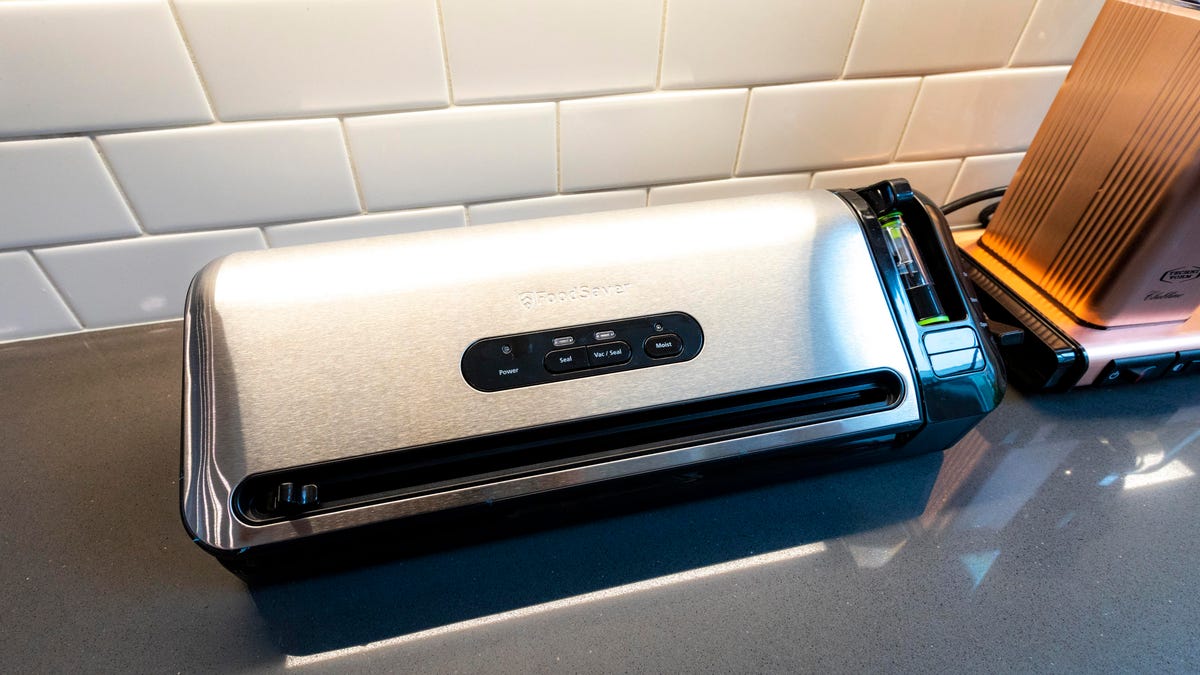 Why You Can Trust CNET
Why You Can Trust CNET 6 reasons to get a vacuum sealer (that aren't just food storage)
They're good for far more than sous vide.

Far from a gimmicky infomercial product, vacuum sealers are incredibly useful at preserving food. They exploded in popularity in the late 90s and early 2000s with the rise of Foodsaver (shout out to everyone who remembers those infomercials), but then sort of faded into the background of the culinary world.
That is, until sous vide cooking became the hot new thing for home chefs a few years ago. Vacuum sealers are used in professional kitchens for sous vide and so people started getting them en masse again to cook sous vide at home.
If you've been eyeing a vacuum sealer, either for sous vide or something else, there are several good reasons to get one.
Bulk meat and cheese storage
When home vacuum sealers first became popular in the 90s, one of the key selling points was that you could buy highly perishable items, like meat and cheese, in bulk and preserve whatever you can't use right away. Buying in bulk is often far more cost-effective, especially when it comes to beef and chicken.
Today, that's still one of the best reasons to get a vacuum sealer.
Air is your biggest enemy to maintaining the food's quality over time. Oxygen allows mold to grow, which is why that open block of cheese in the fridge wrapped in plastic wrap turns fuzzy after a few weeks.
In the freezer, any air that comes in contact with food will dehydrate and oxidize it, causing freezer burn. Get out as much of the air as possible, and you'll reduce the risk of both.
Sous vide cooking
You do not need a vacuum sealer to cook sous vide. A sink or pot full of water and a zip-top bag will suit you just fine to cook steak, chicken, fish and more with your immersion circulator.
However, if you really love to cook sous vide and do it often, a vacuum sealer will save you hassle of working with finicky zip-top bags. It also ensures you get as much air out as possible, which prevents the bag from floating while cooking.
Read more: Use this hack to 'vacuum seal' any freezer bag
Save ingredients for later
You bought a huge bunch of cilantro for a recipe that calls for just a tablespoon. And now you're stuck with a bunch of leftovers that will wilt in a matter of days. Or, your tomato plant is producing more tomatoes than you can give away, but you don't want your precious fruit to go to waste.
A vacuum sealer can help preserve most fruits, vegetables and herbs for weeks in the refrigerator or months in the freezer.
A vacuum sealer can keep vegetables, fruits, and herbs fresh for weeks, instead of days.
Dry sealing in jars
For dry ingredients that go bad quickly but you only use small amounts at a time -- think spices, nuts, yeast -- sealing them in a bag isn't the most effective way to preserve them.
Instead, try vacuum sealing them a glass canning jar. You can buy attachments for many vacuum sealers that work with jars. The benefit here is that you can open the jar, take out what you need and easily reseal it. With a vacuum bag, you'll have to keep cutting open the bag, which ends up wasting plastic.
Re-seal your bag of chips
Potato and tortilla chips are notorious for quickly going stale once you tear into the bag. Though vacuuming all of the air out of the bag will just end up crushing them, you can use a vacuum sealer to only reseal it.
Keep wine fresh
Yes, a vacuum sealer can do that! With a bottle stopper attachment, you can reseal open bottles of wine to save them for later. Just don't use these with sparkling wines. The vacuum seal pulls out all of the air, which will just cause sparkling beverages to go flat.
These attachments also work for preserving oils and vinegars, especially homemade oil infusions and expensive, speciality products you don't want to waste.
Preserve non-food stuff
Outside of the kitchen, a vacuum sealer can protect vital documents (think birth certificates, car titles, your will) against water damage in case of a flood or burst pipe.
In your emergency kit, you can vacuum seal items that can degrade over time, like bandages or medications. It's also smart to seal stuff that shouldn't get wet, like matches.

